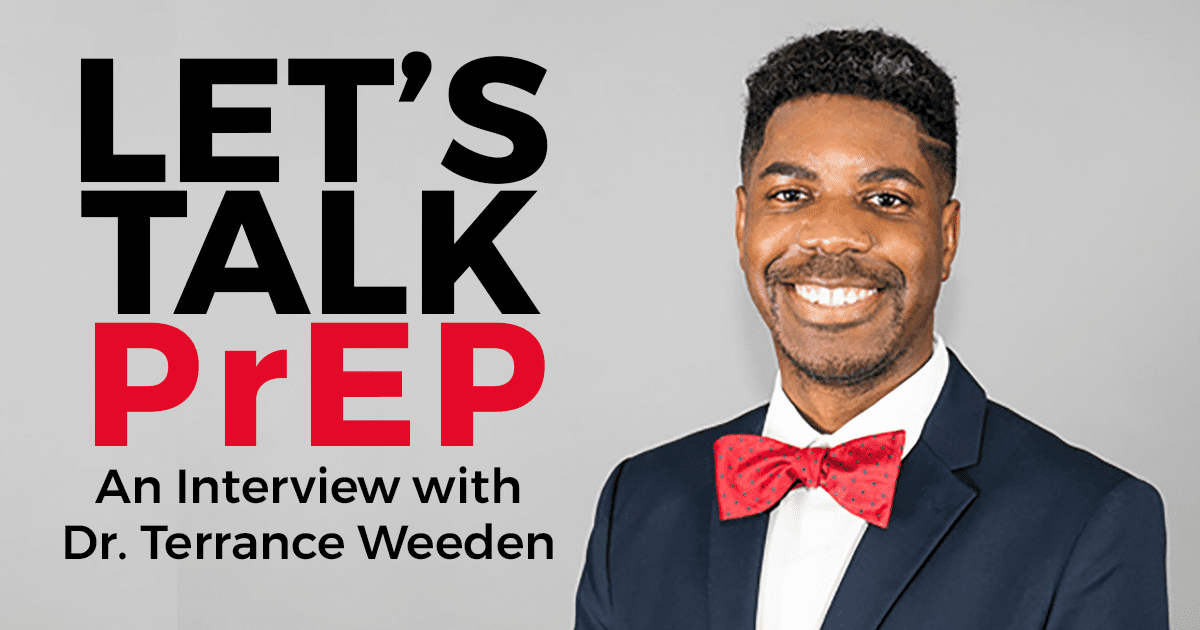
President Biden in his FY23 budget proposal called for the creation of a new mandatory program to make Pre-Exposure Prophylaxis (PrEP) accessible to all uninsured and underinsured people in the U.S., at no cost to them. PrEP is an essential part of the solution to address the impact of HIV, and with existing disparities within the LGTBQ+ community as well as among Black and Latinx people, a national PrEP program could help address some of these disparities and access issues. I sat with Dr. Terrence Weeden, current AFC Associate Board Member, and member of the AFC Policy & Advocacy Committee, to discuss PrEP, the stigma surrounding it, and how a national PrEP Program can help.
Thank you for agreeing to this. What made you want to get into adolescent medicine?
Weeden: I always knew I wanted to go into pediatrics, but I saw a greater need for providing healthcare to adolescents. It also gave me a chance to talk about things that many, though not all, general pediatricians aren’t comfortable talking about such as substance use, sexual health, reproductive health, gender and sexuality. I enjoyed talking about those topics with patients, compared to my co-residents during my pediatric residency. I feel like adolescent medicine is unique in that it bridges the gap between Pediatrics and Adult medicine. You can still make an impact on teenagers’ lives.
For anyone unfamiliar with the subject, how would you describe PrEP and PEP?
PrEP stands for pre-exposure prophylaxis. PrEP is a daily medication taken to prevent HIV. Post-exposure prophylaxis, or PEP, is medication taken if you think you’ve been exposed to HIV, which greatly reduces your chances of acquiring HIV. It’s important to know that PEP is time sensitive and should be taken as soon as possible within 72 hours of a known exposure to HIV, since its effectiveness is reduced the longer you wait to take it.
President Biden wants to make it possible for everyone to get PrEP, including the uninsured and the underinsured. What are your thoughts on this?
I feel it’s important, because the goal is to eliminate HIV, and one way we can do that is to provide not only equal access but equitable access to PrEP, and to PEP.
How does PrEP play into the statewide plan to end the HIV epidemic in IL by 2030, the Getting to Zero Illinois initiative (GTZ-IL)?
One way to get to zero [net HIV transmissions] is to have equal and equitable access to both PrEP and PEP, without having to worry about whether insurance will cover it, or whether your doctor will have bias or judgment towards you or wondering where you can get the prescription. We need to eliminate the economic and social barriers that prevent people from going to their doctor and starting AND continuing PrEP.
What role do physicians play in better promoting PrEP to their patients?
I think it’s powerful when physicians speak up about PrEP and advocate for more access to PrEP. It’s also one thing to start on PrEP, it’s another thing to continue treatment and be engaged with the provider to ensure the person maintains a negative HIV status. We as physicians must be diligent about our follow-up to encourage people to remain engaged in care. Physicians should really speak up more about the need to increase access to PrEP and to have more conversations about PrEP, HIV, and sexual and reproductive health in general. There’s still a lot of stigma and uneasiness around talking about these subjects. There’s still a lot of stigma within Black and Brown communities and healthcare professionals of all races and backgrounds regarding HIV.
1.2 million individuals are estimated by the Centers for Disease Control and Prevention (CDC) to need PrEP, and only 9% of Black individuals and 16% of Latinx people have accessed it by 2020, compared to 66% of White individuals. By end of 2019, White people accounted for only 28% of the estimated total number of people living with HIV in the U.S. compared to 40% for Black people and 25% for Latinx people, despite White people making up 59.3% of the population in the U.S. and Black and Latinx people making up only 13.6% and 18.9% of the population, respectively. Why do you think such discrepancies exist among Black and Latinx communities when compared to the White community?
A lot of factors come into play. There are societal barriers preventing Black and Brown people from having access to a doctor in general, let alone a doctor who is familiar with PrEP, knows enough about PrEP and is comfortable to have conversations about PrEP, HIV, and sexual health. It’s also dependent on whether Black and Brown people have access to health insurance, which is tied to educational attainment and job status, for example. These socioeconomic barriers have been in place for multiple generations and are being mirrored in the inequities in healthcare, specifically regarding HIV.
Do you feel that stigma exists within the medical field, particularly among doctors, when it comes to HIV treatment and care?
Yes, and I think the culture is slowly shifting. When I was in medical school not long ago, we were taught that “certain populations” are considered “high risk,” and so that feeds into implicit bias where you say, “OK, this is a Black gay man, I should talk about these certain things because he’s at risk for these certain things,” regardless of whether it’s true for that person or not. I do think that there is some value to that thought process from the standpoint of preventing disease and death and trying to eradicate health inequities, but I also think that, overall, the Queer experience among people of color is not monolithic. Implicit and explicit biases exist among doctors who may or may not have preconceived notions that patients from Black and Brown and/or Queer communities are at risk for certain illnesses, and that they should only talk to them about these illnesses… this is not entirely true. You can miss the entire picture when you’re laser-focused on one thing.
Apart from a lack of knowledge about PrEP, what else prevents people from seeking PrEP care?
Insurance–or lack thereof. I see it often. Insurance impacts the kind of treatments, the kind of care you get, and where you can get it. There are also concerns of the side effects of PrEP. PrEP is generally well tolerated. However, in rare cases it can affect renal function. This is why regular check-ups with your doctor are important, since they evaluate your renal function and other important health indicators to make sure the medication isn’t harming you.
Are we moving in the right direction in terms of eliminating PrEP stigma?
That’s a good question. I think with time, stigma will go away. I’m grateful that there is a new form of PrEP that is a long-acting injectable, Apretude, so that will provide more options for people who are vulnerable to HIV and who want to start PrEP, but don’t want to take a pill every day. It involves a periodic injection to prevent HIV.
Is PrEP right for everyone?
Any medication can have an impact on your body. Some people may experience issues with kidney function and bone density loss. As stated earlier, those negative side effects are rare and are screened for when on PrEP. Beyond that, PrEP is for anyone who wants to remain HIV negative.
Let’s wrap up by coming back to President Biden’s National PrEP Program proposal, which would make PrEP more accessible for people who don’t have insurance or who are underinsured. What are some key takeaways that you would want a person reading this blog post to walk away with?
There is still bias and stigma that needs to be addressed, both on the patient side and on the physician side. Doctors need to advocate for this national PrEP program. There are disparities that still exist within medicine (including HIV) despite modern technology and all the advances of modern medicine, even when HIV is preventable. I think having a national PrEP program would be a good step–a huge step–towards achieving the goal of Getting to Zero, to essentially eradicate HIV in the United States. Having equal and equitable access to PrEP would ensure that everyone who desires access to PrEP can receive it.

